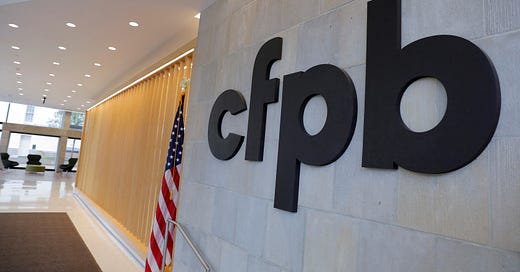Dismantling CFPB Deregulates Corrupt Financial Institutions
The Trump Administration is getting rid of an agency dedicated to protecting consumers finances because they want to scam you.
NEW YORK — New York Attorney General Letitia James is leading a coalition of 23 attorneys general in an effort to keep the Consumer Financial Protection Bureau (CFPB) functioning, as the Trump administration and Elon Musk’s Department of Government Efficiency (DOGE) continue efforts to dismantle the agency.
The attorneys general filed an amicus brief in National Treasury Employees Union v. Russell Vought, supporting CFPB employees who have been ordered to halt investigations into deceptive and abusive practices by financial institutions.
This has led to the suspension of numerous ongoing investigations into alleged corporate malfeasance. For instance, probes into companies such as Carvana, Mr. Cooper, and CareCredit have been frozen, potentially denying accountability and financial relief for affected consumers. Additionally, the CFPB has dropped nine lawsuits that it had brought on behalf of consumers, effectively freeing major financial firms like Capital One and Rocket Homes from the threat of consequences for their alleged significant wrongdoing.
According to James, the administration’s efforts to eliminate the CFPB will leave consumers vulnerable to predatory lending, excessive fees, and financial fraud.
“Consumers, from homeowners to credit card users to student borrowers, have all been protected by the CFPB, and weakening this agency puts consumers and everyday Americans at risk,” James said. “The Trump administration wants to do away with the CFPB just to give billionaires like Elon Musk and bad actors within big tech and other industries a free pass to prey on everyday people. New Yorkers and all Americans deserve to have strong consumer protections, and that is why I am leading a coalition of attorneys general to defend the CFPB and the employees that make it successful.”
The CFPB was created in 2011 as part of the Dodd-Frank Wall Street Reform and Consumer Protection Act in response to the 2008 financial crisis, which exposed widespread fraud and predatory practices in the mortgage and banking industries. The crisis, triggered mainly by reckless and deceptive lending by major financial institutions, led to millions of foreclosures, the collapse of major banks, and a severe economic downturn.
Before the crisis, no single federal agency was dedicated to protecting consumers from financial exploitation. Instead, consumer protection responsibilities were spread across multiple agencies, which often prioritized the health of financial institutions over consumer rights. The CFPB was designed to fill this gap by serving as an independent watchdog focused exclusively on enforcing federal consumer protection laws and holding financial institutions accountable.
Since its creation, the CFPB has secured over $20 billion in refunds and relief for defrauded consumers. The agency enforces laws against predatory lending, deceptive financial practices, and illegal debt collection tactics. It has cracked down on hidden banking fees, payday loan schemes, and abusive mortgage lending practices—many of the same practices that contributed to the 2008 crisis.
Despite the Trump administration's claims that eliminating the CFPB would cut unnecessary government spending, the agency has proven highly cost-effective. Since its formation, the CFPB has returned an average of $1.6 billion per year to consumers while operating on an annual budget of approximately $810 million. This means the agency recovers nearly double its budget in financial relief for Americans, making it a prime example of an efficient consumer protection program rather than wasteful spending.
On February 9, the Trump administration ordered CFPB employees to cease all investigations and refrain from launching new cases. The administration argues that the CFPB represents government overreach and hinders financial innovation. Musk’s DOGE agency has positioned the CFPB as an obstacle to economic growth.
However, in reality the efforts to undermine the CFOB are an attempt to deregulate the financial sector and remove oversight of major corporations, including Big Tech firms looking to expand into financial services.
Musk has been vocal about his plans to turn X (formerly Twitter) into an “everything app,” including integrating banking and payment services. His vision includes allowing users to hold money, send payments, and even take out loans directly through X, making it a competitor to traditional banks and financial institutions. Similarly, other tech companies, such as Meta, have explored entering the financial sector, with past initiatives like Libra, a cryptocurrency-based payment system that faced intense regulatory scrutiny before being abandoned.
Eliminating the CFPB would strip away federal oversight of these ventures, raising concerns about potential fraud, misuse of customer funds, and a lack of transparency in how these companies handle financial transactions. Without the CFPB, consumers would have little recourse if they were misled or harmed by financial products offered by tech giants.
“In their brief, Attorney General James and the coalition argue that the administration’s efforts to destroy the CFPB could prevent consumers from reporting issues of fraud or deception,” a statement from James’ office read. “The attorneys general warn that this may lead to financial institutions loosening their regulatory compliance, as was seen in the years leading up to the 2008 financial crisis.”
Joining James in filing the amicus brief are attorneys general from Arizona, California, Colorado, Connecticut, Delaware, Hawaii, Illinois, Maine, Maryland, Massachusetts, Michigan, Minnesota, Nevada, New Jersey, New Mexico, North Carolina, Oregon, Rhode Island, Vermont, Washington, Wisconsin, and the District of Columbia.
James emphasized the importance of maintaining strong oversight in the financial sector, particularly as technology companies move further into banking.
“The CFPB has returned billions to defrauded consumers, slashed junk fees, and stopped predatory auto and mortgage lenders,” she said. “Eliminating it would roll back years of progress and leave everyday Americans at the mercy of financial institutions that prioritize profits over people. As Big Tech moves into banking, we need more consumer protection—not less.”




